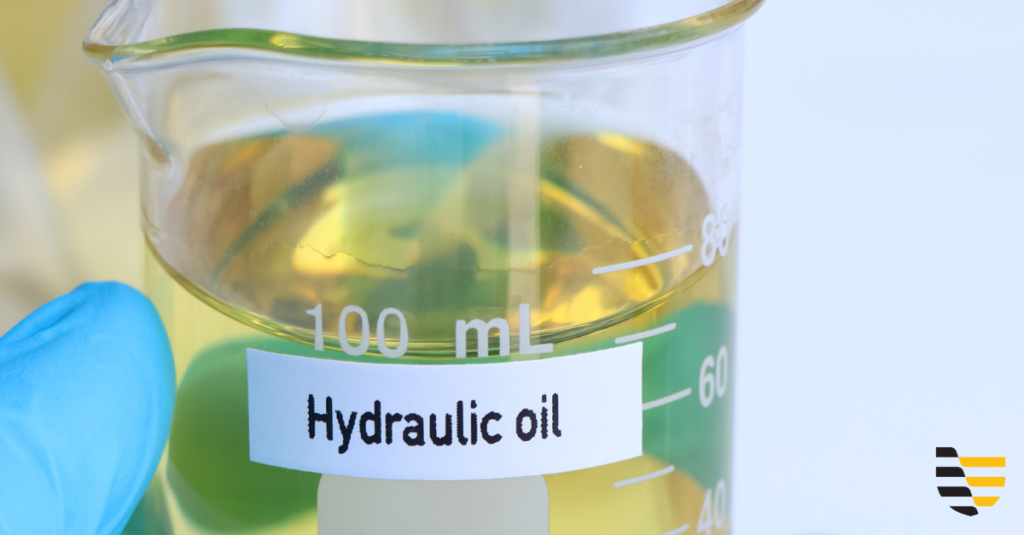PCI Hydraulics+ offers the world’s highest quality high-pressure hydraulic components and yet we do not often discuss the properties of the hydraulic fluid.
Every time you press your car's brake pedal, step into an elevator, or buy products shipped from overseas, you're relying on a critical yet often overlooked substance: hydraulic fluid.
This liquid is the lifeblood of modern civilization, powering everything from the chair at your local salon to the massive cranes that load cargo ships in ports worldwide.
It quite literally keeps the global economy moving—enabling manufacturing plants to operate, crops to be harvested, buildings to be constructed, and goods to be transported across continents.
But what is hydraulic fluid?

Hydraulic fluid is a specialized liquid that transfers power through mechanical systems using a fundamental principle of physics known as Pascal's Law: when pressure is applied to a liquid in a closed space, that pressure spreads equally in all directions.
Imagine squeezing a water balloon—the pressure you apply with your hand is felt throughout the entire balloon. Hydraulic fluid works the same way, but it's engineered to be more effective than water.
What makes hydraulic fluid special is that it can't be compressed (like squishing a sponge) and has just the right thickness to flow efficiently. These properties make it perfect for transferring force from one place to another—like when you press your brake pedal and that force is carried through the fluid to stop your car's wheels.
This simple but powerful technology has become so essential that the global hydraulic fluids market, valued at $7.6 billion in 2021, is expected to reach $12.0 billion by 2030.
Modern hydraulic fluid starts with a base oil—typically mineral oil, synthetic oil, or bio-based oil—enhanced with a specialized blend of additives that give it the exact properties needed for demanding industrial use.
These additives, making up between 0.1% and 30% of the total composition, are carefully selected to meet specific performance requirements.
For example, hydraulic fluids used in food processing equipment must be non-toxic and use food-grade additives, while those used in extreme temperatures require special additives to maintain performance.
The ongoing development of new formulations, particularly environmentally friendly options, continues to drive innovation in the industry.

Three main types of hydraulic fluid dominate the market, each with distinct advantages and ideal use cases.
Mineral hydraulic fluid, derived from refined petroleum, is the industry workhorse. Its widespread adoption stems from its reliable performance and cost-effectiveness, making it the go-to choice for standard industrial applications.
This type performs well under normal operating conditions and offers a good balance of properties without breaking the bank. You'll find mineral-based fluids in everything from manufacturing equipment to construction machinery.
Synthetic fluids excel in situations where mineral oils fall short—particularly in very hot or cold environments. While they come with a higher price tag, their superior durability and longer service life often justify the investment.
This segment is experiencing the fastest growth in the hydraulic fluid market as industries increasingly require fluids that can handle demanding conditions, enhance energy efficiency, and provide more consistent performance.
As environmental concerns grow, bio-based hydraulic fluids are gaining traction as a sustainable alternative. Made from renewable resources like vegetable oils, these fluids offer natural biodegradability and significantly lower toxicity compared to their conventional counterparts.
They're particularly valuable in environmentally sensitive applications—think forestry equipment operating near waterways or food processing machinery where contamination risks must be minimized.

Without hydraulic fluid performing perfectly, our modern world would quite literally grind to a halt. Hydraulic fluid's multiple functions are so essential that a single system failure can shut down entire production lines, strand cargo ships in port, or leave construction projects at a standstill.
Several features in particular make hydraulic fluid so indispensable:
Hydraulic fluid makes it possible to lift hundreds of tons with precise control due to its invisible force multiplier, which can increase power by 5 to 100 times, depending on how the system is designed.
Without it, construction would be drastically slower and more dangerous, ports would be crippled, and manufacturing would be far less efficient.
The protective barrier hydraulic fluid creates between moving parts isn't just helpful—it's critical for preventing catastrophic equipment failure.
A single hydraulic system failure in a major manufacturing plant can cost millions in lost production time.
If a hydraulic system exceeds the rated temperature of the system during operation, it can cause excessive damage.
Hydraulic fluid helps prevent overheating by absorbing and dissipating heat generated during system operation.
It also maintains proper viscosity and reduces friction, minimizing heat buildup and protecting components from thermal damage.
The sealing and protective functions of hydraulic fluid are so vital that even minor degradation can lead to major consequences. When hydraulic fluid fails to maintain proper seals or protect against corrosion, the result can be sudden system failure—potentially causing accidents, environmental damage, or production losses.
That’s why industries like aerospace and medical equipment manufacturing invest heavily in premium hydraulic fluids with enhanced protective properties.
In precision hydraulic systems, even microscopic particles can cause significant damage over time. The fluid's ability to capture and remove these tiny contaminants is essential for preventing catastrophic equipment damage and costly downtime.
Modern manufacturing facilities monitor hydraulic fluid cleanliness as closely as they track production metrics, knowing that contaminated fluid can drastically reduce a system's lifespan and lead to premature equipment failure.
Each property reinforces the others—the fluid's power transmission ability depends on proper sealing, which requires effective contamination control, while lubrication and heat management work hand in hand to protect hydraulic system components.
It's this unique combination of capabilities that makes hydraulic fluid one of the most vital components of modern industrial technology.

From the precise movements of robotic manufacturing to the raw power of construction equipment, hydraulic fluid quietly performs its critical functions behind the scenes. While most people will never see or handle this essential liquid directly, its impact touches virtually every aspect of our modern world.
As industries continue to advance and automation becomes increasingly vital, the importance of this remarkable fluid—and the systems it powers—will only continue to grow. For over 35 years, PCI Hydraulics+ has been the trusted source for high-quality hydraulic components and expert support for distributors nationwide. Request a quote today to learn how we can strengthen your supply chain.
